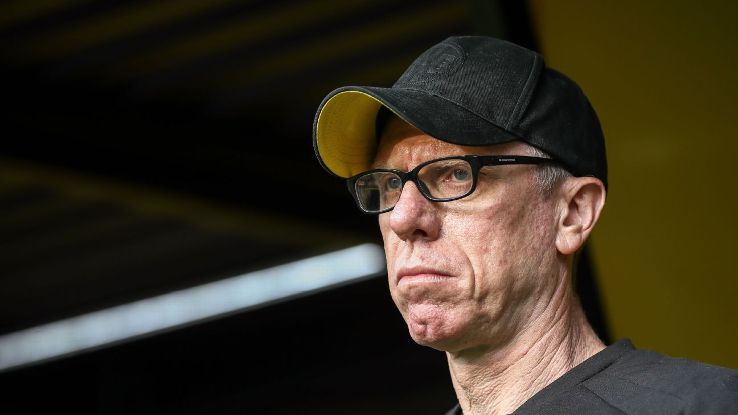

It began with the Yellow Wall denouncing their team as “failures” and fakes — “No one epitomises Borussia Dortmund as little you do,” a giant banner alleged — and finished with the hard-core fans on the south stand serenading a player from opponents Bayer 04 Leverkusen.
In between those two remarkable bookends was a thrilling 4-0 win by the Black and Yellows over the in-form Werkself, a result that all but guarantees Peter Stoger’s side a spot in the Champions League next year. Still, it wasn’t enough to placate the crowd on Saturday evening. At the club that markets its merchandise with the claim of Echte Liebe (“Real Love”), the relationship status remains … complicated.
Dortmund’s meek 2-0 defeat in the Revierderby against Schalke last weekend brought out convulsions of discontent that hasn’t been seen since the first half of Jürgen Klopp’s final campaign in East-Westphalia, back when Borussia had flirted with relegation. While many observers had pointed to coach Stoger’s passivity on the touchline, as well as the long-running absence of any discernible tactical cohesion on the pitch in the aftermath of the capitulation at the Veltins-Arena, the BVB ultras felt the players had “not understood the significance of the derby” and showed “no will, no passion, no courage” against their hated rivals.
Despite these grave accusations, spelled out on two huge placards, the team approached the south stand at the final whistle, eager to celebrate. “But they told us to go back,” said midfielder Julian Weigl. “The anger was still there.”
To drive home the message that they didn’t yet consider the side worthy of their adulation, the Yellow Wall instead enthusiastically cheered former BVB cult hero Sven “Manni” Bender upon his return. The 28-year-old, who had moved to Bayer in the summer after eight years at the Signal Iduna Park, was surprised and moved. “No one’s ever applauded me this much after losing so badly,” he said.
The lionisation of Bender, one of the quietly important and always thoroughly committed representatives of the successful Klopp era, echoed CEO Hans-Joachim Watzke’s insistence a few weeks ago that the team needed more players willing to fight and bleed for the shirt. With the help of Champions League money, Dortmund are set to embark on a fairly radical overhaul of the squad. There are unconfirmed (but not vociferously denied) reports of a black list with nine pros whom the club wants to move on next season. Among them, allegedly, are veterans such as Nuri Sahin and Gonzalo Castro, as well as new recruits such as Jeremy Toljan.

Quality and performance output aren’t the only criteria if Watzke is to be believed. Dortmund want more players who truly identify with the club and foster the kind of togetherness that has been missing in recent seasons. The bosses have surmised that amassing a squad of gifted individuals who see Dortmund as merely a stepping stone has made plenty of economic sense while hampering sporting success.
Finding true “team players” who tick all the relevant boxes (price, age, talent, temperament) won’t be easy. A greater regard for some of the soft, human factors in future recruitment might help in that regard but the real work is only done later, both on the training pitch and in the dressing room. Knee-jerk complaints about a lack of leaders or solidarity, which tend to greet crises at any club, are often a convenient way to deflect criticism from the man who primarily is charged to get 23 players to bond and perform as a functioning unit.
Stoger might well be a thoroughly decent man who is tactically more clued up than he lets on. But the inconsistent performances of his team, and the club’s public grumblings about dressing room strife, don’t paint his man-management skills in the best light.
Dortmund have said no decision about the Austrian’s future has been taken yet, but in recent weeks, the 52-year-old has come close to admitting that the job is (probably) beyond him. Dortmund do need a more dynamic, proactive coach to complement the proposed rebuild of the side.
Perhaps, on the evidence of this past weekend, such changes don’t even need to be wholesale. Saturday’s win, starring the irrepressible Marco Reus, the wildly erratic but hugely exciting teenager Jadon Sancho and two key players who had been mysteriously sidelined recently (Mario Gotze and Weigl), was a timely reminder of Dortmund’s inherent quality, especially in attack.
Stoger’s decision to demote out-of-form captain Marcel Schmelzer to the stands was thoroughly vindicated too. Manuel Akanji, a centre-back by trade, deputised brilliantly for the 30-year-old on the left side of defence. “I’ll play wherever the manager needs me, even as a striker,” joked the Swiss international.
Everyone will be hugely relieved that this barren season is nearly over and that it will still finish with Dortmund getting into the Champions League. Two failed managerial appointments in quick succession, as well as the one or two missteps in the transfer market, should not blind the men in charge, nor the supporters, to the considerable firepower of this team. A few choice additions at the full-back positions, a few more ideas on the tactics board and a bit more balance overall would see Dortmund lift themselves to a much higher level in no time.
With better football, the love in the stands will surely return too.
Raphael Honigstein is ESPN FC’s German football expert. Follow: @honigstein

Be the first to comment